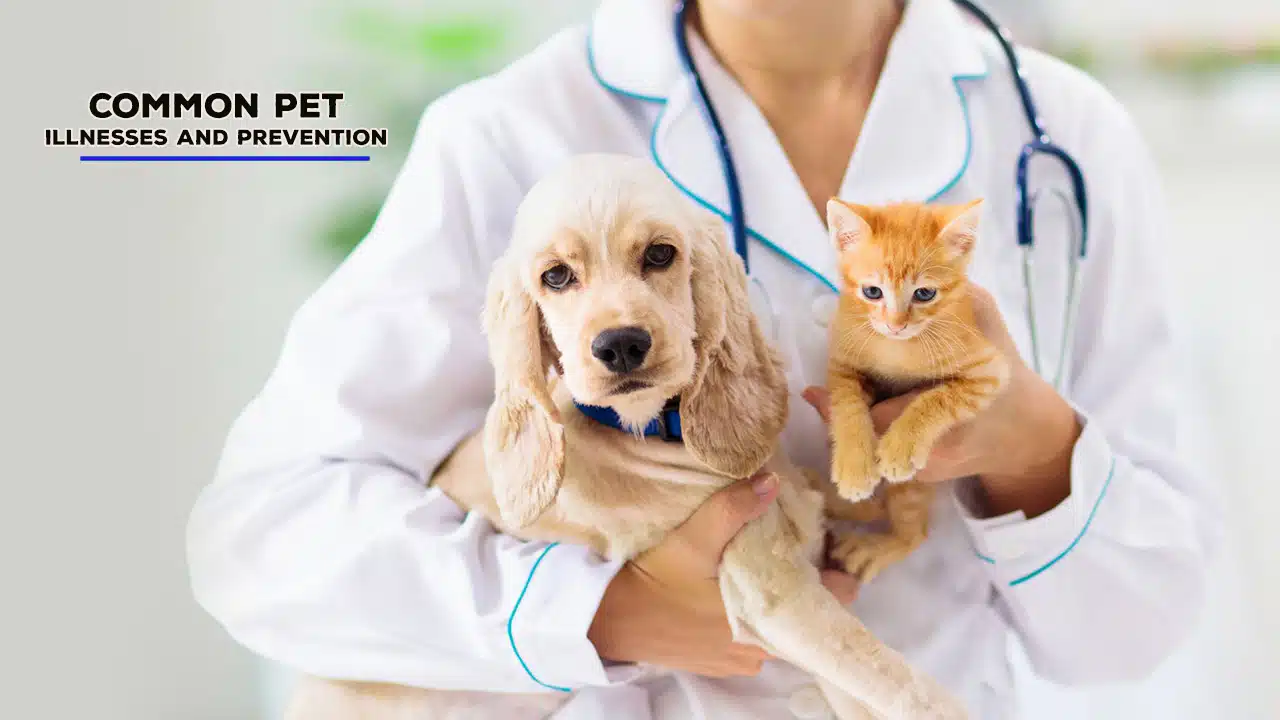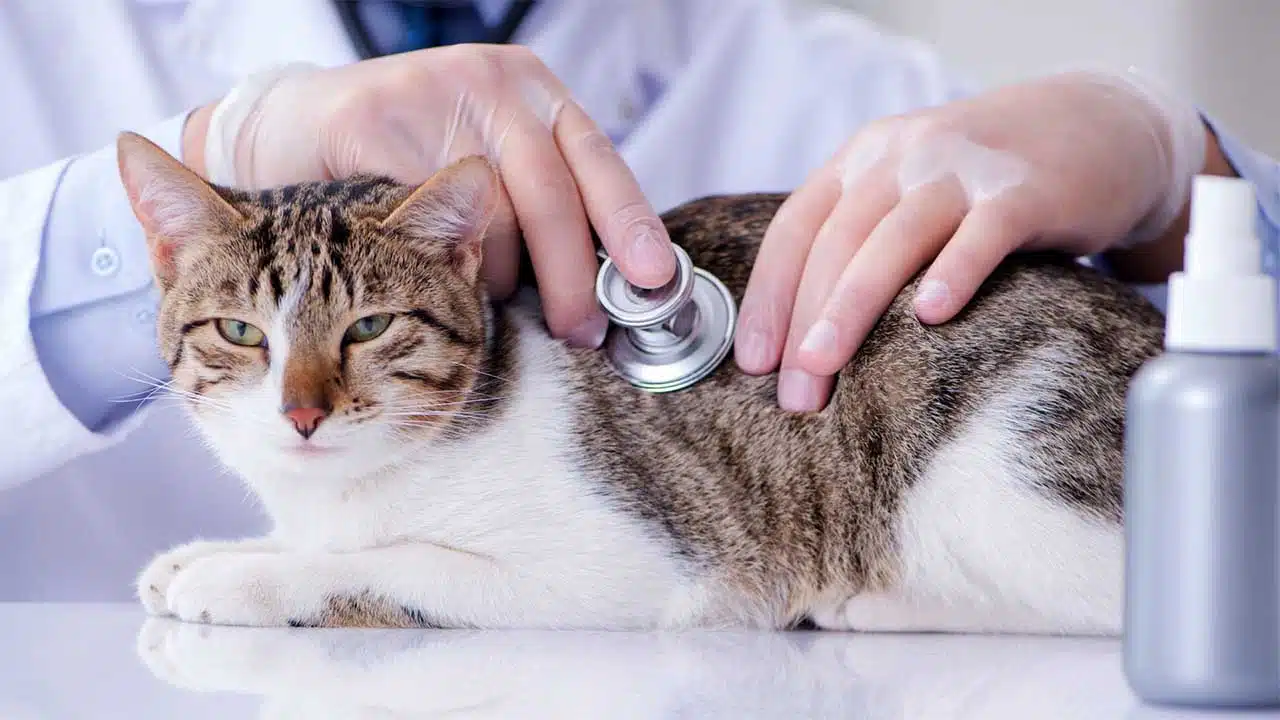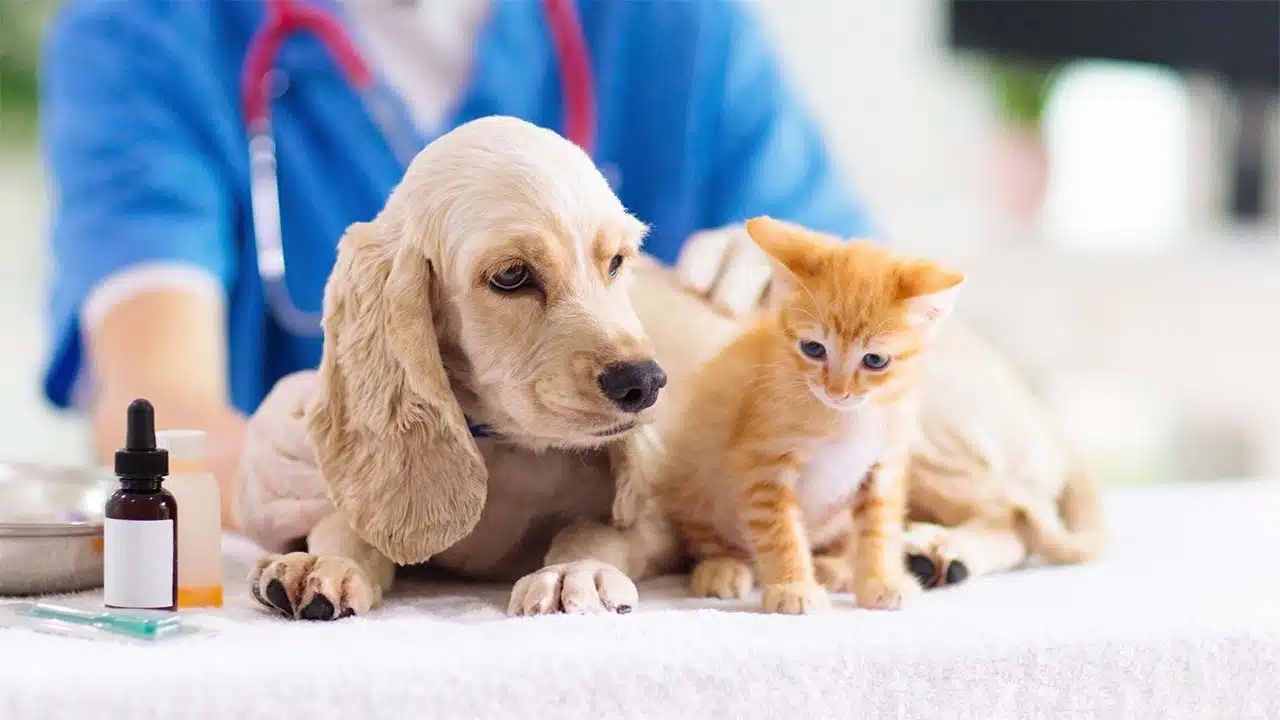Taking care of your pet’s health is one of your most important responsibilities as a pet owner. Ensuring your furry friend stays vibrant and happy involves knowing about common pet illnesses and how to prevent them.
Why should you care so much about these common ailments? Understanding them allows you to take early action and help your pet avoid unnecessary suffering.
From recognizing the subtle signs of ailments to understanding the necessary steps for prevention, being informed is crucial.
Your awareness and prompt action can significantly impact your pet’s quality of life. Efficient and effective care means fewer trips to the vet and a healthier companion by your side.
Understanding Common Pet Illnesses
It’s crucial to be aware of the signs and symptoms of common pet illnesses to ensure timely care. Knowing the causes and risk factors can help keep your pet healthy and happy.
Signs and Symptoms to Watch For
Pets often hide signs of illness, making early detection challenging. Look for changes in behavior like lethargy, decreased appetite, or increased thirst.
- Digestive Issues: Symptoms include vomiting, diarrhea, or constipation. These could be signs of infections or dietary problems.
- Respiratory Symptoms: Coughing, sneezing, and nasal discharge are common. These can indicate infections or allergies.
- Skin Problems: Itching, redness, and hair loss often point to allergies, parasites, or infections.
Regular vet check-ups are essential for catching issues early.
Causes and Risk Factors
Understanding what causes pet illnesses helps in prevention. Frequently, illnesses are triggered by infections, poor diet, or lack of exercise.
- Infections: Bacteria, viruses, and fungi can cause various diseases. Vaccinations are critical in preventing these illnesses.
- Diet: Poor nutrition leads to obesity, diabetes, and other health problems. A balanced diet helps maintain overall health.
- Environment: Hazards at home or outdoors increase risk. Ensure your pet’s living space is clean and hazard-free.
Awareness of these risk factors can help you take preventive measures.
1. Kennel Cough – Prevention: vaccination
Kennel cough is a common respiratory illness in dogs. It spreads quickly, like a cold. Vaccination is critical if your dog often meets other dogs, especially indoors.
The kennel cough vaccine protects against one of the leading causes, Bordetella bronchiseptica. Ask your vet about this. It’s often required for boarding, grooming, and daycare.
Annual vaccination is usually recommended. In some cases, a booster may be needed every six months. Check with your vet for the best schedule.
Vaccination isn’t 100% effective, but it dramatically reduces the risk. It also helps to lessen the severity if your dog does get sick.
Ensure all dogs your pet interacts with are vaccinated. This helps keep the community healthy and stops the spread.
A healthy dog community means happier, safer pets. Prioritize vaccination for your dog’s well-being.
2. Parvovirus – Prevention: Early Vaccination
Vaccinating your dog early is the best way to prevent parvovirus. The parvovirus vaccine is a core vaccine for dogs. It is usually given as part of a combination shot that protects against other diseases like distemper.
Puppies should receive their first parvovirus vaccination at six to eight weeks of age. They need booster shots every three to four weeks until they are about 16 weeks old.
Adult dogs that have never been vaccinated should get two doses, two to four weeks apart.
This prevents the spread of the highly contagious and dangerous virus. Even though adult dogs are at lower risk, they should still be vaccinated to protect themselves and other dogs they may encounter.
Keeping your dog’s vaccinations up to date is crucial. Unvaccinated dogs are more likely to get sick and can spread the virus to others. The vaccine is very effective, but no vaccine offers 100% protection, so it’s essential to maintain good overall hygiene and keep your dog away from sick animals.
Early vaccination is vital to a healthy and happy life for your dog. Follow your vet’s recommendations to keep your pet safe from parvovirus.
3. Fleas – Prevention: Regular Flea Treatment
Fleas can cause itching, allergic reactions, and even diseases in pets and humans. Regular flea treatment is essential to avoid these problems.
Maintaining flea control on your pet involves using flea preventatives regularly. These treatments come in various forms, like topical solutions, oral medications, and flea collars.
Your home must also be kept clean to prevent flea infestations. Regular vacuuming and washing pet bedding can help minimize the flea population. Consider treating your house indoors and outdoors to eradicate fleas in the environment.
Consistency is crucial. Ensure you follow the treatment schedule your vet recommends without missing any applications. Skipping doses can give fleas a chance to repopulate.
Regular check-ups with your vet can help adjust flea treatments based on your pet’s needs and the local flea population. Ask your vet for the most effective flea-preventative products available.
Being diligent with flea treatments and maintaining a clean environment allows you to keep your pet and home flea-free.
4. Heartworm – Prevention: Monthly Heartworm Medicine
Heartworm is a severe illness for dogs. Preventing it is crucial. The best way is to give your dog monthly heartworm medicine.
How do you start? First, get a prescription from your vet. They will choose the best medicine for your dog.
Why is monthly medicine critical? It kills heartworm larvae before they grow into adults. Adult heartworms can harm your dog’s heart, lungs, and blood vessels.
Do you think your dog doesn’t need it? Heartworms are in all 50 states. Even indoor dogs are at risk. Mosquitoes, which spread heartworms, can get inside your home.
What happens if you skip a dose? Missing just one month can put your dog at risk. Set a reminder to make sure you never miss a dose.
What about side effects? Most dogs have no problems. Rarely, some may have mild side effects like vomiting or diarrhea. If you notice anything unusual, call your vet.
Is it expensive? The cost of monthly prevention is much less than the cost of treating heartworm disease. Regular medicine also means fewer vet visits and a healthier dog.
Stay proactive with your dog’s health. Use monthly heartworm medicine and keep them safe from this dangerous disease.
5. Tick-borne Diseases – Prevention: tick prevention collar
Ticks are tiny parasites that can harm your pets by spreading diseases. A tick prevention collar is an effective way to protect your pets.
Tick prevention collars release substances that repel or kill ticks. These collars often use natural or chemical agents. They gradually release these substances over your pet’s skin and fur, providing long-term protection.
When choosing a collar, look for ones specifically designed for your pet’s size and age. Some collars are waterproof, making them suitable for pets that love water.
Make sure to follow the instructions on the collar packaging. This ensures that it fits correctly and provides the best protection. Regularly check the collar to see if it is working and not too tight.
A tick-prevention collar can be a simple way to protect your pets from tick-borne diseases. It’s one of the best tools for keeping your pets healthy and happy.
6. Feline Immunodeficiency Virus (FIV) – Prevention: Keeping Cats Indoors
Feline Immunodeficiency Virus (FIV) is a severe illness in cats. It weakens their immune system. This makes them more likely to get other infections. Keeping your cat indoors can help prevent FIV.
Why keep your cat indoors? Indoor cats are less likely to meet other cats that might have FIV. Outdoor cats can get into fights. FIV spreads through bites and scratches. By staying inside, your cat avoids these risks.
Keeping your cat indoors also keeps them safe from other dangers. Cars, predators, and harsh weather can all harm your cat. Indoor cats generally live longer and healthier lives because they avoid these threats.
Make your home attractive for your cat. Provide toys, scratching posts, and climbing trees. Play with your cat every day. This keeps them happy and active while indoors. You can even build a window perch so they can watch the outside world safely.
Keeping your cat indoors protects them from FIV and many other dangers. It is one of the best things you can do for their health and safety. Take steps today to make your home a fun and safe place for your cat.
7. Canine Distemper – Prevention: vaccination
Canine distemper is a severe disease that affects dogs and other animals. To protect your dog, vaccinations are crucial. Vaccinating your dog can prevent the spread of this virus.
Puppies should receive their first distemper vaccination at 6 to 8 weeks. Booster shots follow every 3 to 4 weeks until they are at least 16 weeks old.
Adult dogs need booster shots, too. Annual or triennial vaccinations help keep your dog’s immunity strong. Veterinary guidelines differ, so consult with your vet.
Vaccinations are safe. They can cause mild side effects like soreness at the injection site or low fever. Serious side effects are rare.
Your vet will follow a vaccination schedule suited to your dog’s age, health, and lifestyle. High-risk areas with low vaccination rates make it even more critical.
Preventing distemper through vaccination is not just about protecting individual dogs. It helps keep your entire community’s dog population safe and healthy. Knowledge about the importance of vaccinations ensures fewer cases of distemper.
Keep your dog’s vaccinations up-to-date. Regular vet visits are vital to monitoring your dog’s health and staying on top of necessary vaccines. Stay informed and proactive in preventing canine distemper in your pets.
8. Ringworm – Prevention: Antifungal Treatments
Ringworm is a common fungal infection in pets. The disease causes red, scaly patches on the skin. These patches are often circular. Antifungal treatments can help prevent ringworm from spreading.
Keep your pet’s environment clean. Wash their bedding and toys regularly. Vacuum often to remove any fungal spores. Also, avoid contact with infected animals.
You can apply topical antifungal creams to your pet’s skin. These creams kill the fungus on the surface. Some common antifungal creams include miconazole and clotrimazole.
In some cases, oral antifungal medications are needed. These medications treat more severe infections. Veterinarians often prescribe itraconazole or terbinafine.
Regularly grooming your pet helps, too. Grooming removes dead skin cells and fungal spores. It also keeps their coat clean and free of debris.
If your pet has long hair, consider trimming it. Shorter hair makes it harder for the fungus to grow. It also makes it easier to apply treatments.
Always follow your vet’s instructions. They know the best course of action for your pet. Regular check-ups can catch infections early. Early treatment prevents the spread of ringworm.
9. Dental Disease – Prevention: Regular Teeth Brushing
Dental disease is one of the most common health issues in pets. Brushing their teeth regularly is essential to keep your pet’s teeth healthy and remove dental plaque and tartar that can lead to gum disease and tooth loss.
Start by choosing a pet-specific toothbrush and toothpaste. Human toothpaste can harm pets, so using a product designed for animals is essential. Introduce the toothbrush slowly, allowing your pet to get used to it.
Aim to brush your pet’s teeth daily. If daily brushing is impossible, try to brush at least a few times a week. Gently lift your pet’s lip and brush the teeth in small, circular motions. Focus on the gumline where plaque builds up the most.
Look for signs of dental issues, such as bad breath, red or swollen gums, and difficulty eating. Regular brushing can prevent these problems and keep your pet’s mouth healthy.
Additionally, provide dental chews and toys that help keep teeth clean. They are a great supplement to regular brushing and can make dental care more effective. Regular dental check-ups with your vet are essential to catch and treat any issues early.
You can ensure dental health and overall well-being by brushing your pet’s teeth regularly.
10. Obesity – Prevention: balanced diet and exercise
Pet obesity is a growing problem. Nearly 59% of dogs and 61% of cats in the U.S. are overweight. This can lead to diabetes and arthritis and even shorten their lifespan.
A balanced diet and regular exercise are crucial in preventing obesity in pets. You should consult your vet to choose the best diet for your pet’s needs.
Regular exercise helps maintain a healthy weight. Aim for daily walks, play sessions, and other activities. Adjust the exercise level based on your pet’s age, breed, and health status.
Building a balanced meal and exercise routine can significantly impact your pet’s health. Always measure portions and avoid overfeeding.
Keeping your pet active and feeding them right can help them live a healthier, longer life.
Preventive Measures for Pet Health
Keeping your pet healthy involves taking specific preventive steps. These measures include vaccinations, regular check-ups, and proper nutrition.
Vaccinations
Vaccinations are essential for protecting your pet from serious diseases. Dogs typically receive vaccines for rabies, distemper, parvovirus, and adenovirus. Cats usually get rabies, feline distemper, herpesvirus, and calicivirus vaccines. These vaccines help the immune system recognize and fight off these illnesses.
Your veterinarian will create a vaccination schedule based on your pet’s age, health, and risk of exposure. Puppies and kittens often require multiple doses over a few months, while adult pets may just need annual boosters. Keeping up with vaccinations can prevent usually severe and sometimes fatal diseases.
Regular Vet Check-ups
Regular check-ups are crucial. Your veterinarian will evaluate your pet’s overall health, identifying potential problems early. Annual check-ups often include physical exams, blood tests, and dental assessments. Early detection can significantly improve the outlook for many health issues.
For example, dental exams can detect oral diseases early, preventing pain and more severe health problems. Some diseases like heartworm or flea infestations can be identified through routine tests. Regular vet visits are the best way to ensure your pet stays healthy and receives timely treatment.
Proper Nutrition
Proper nutrition supports your pet’s overall health. Dogs and cats need a balanced diet with essential proteins, vitamins, and minerals. High-quality pet food designed for your pet’s species, age, and health status is necessary. Overfeeding can lead to obesity, which increases the risk of diabetes, heart disease, and joint problems.
Conversely, underfeeding can result in nutrient deficiencies. Fresh water should always be available to prevent dehydration. Your vet can offer guidance on the best diet for your pet, including any necessary supplements or dietary adjustments. Good nutrition is a cornerstone of your furry friend’s long and healthy life.
Takeaways
Taking care of your pet’s health ensures they lead a happy, vibrant life. Being aware of common pet illnesses and their prevention can help you take proactive steps to protect your furry friends. Regular vaccinations, consistent flea and tick treatments, and preventive measures against heartworm and other diseases are crucial.
Additionally, providing a balanced diet, ensuring regular exercise, and maintaining dental hygiene are vital for your pet’s overall well-being.
Regular vet check-ups are indispensable for early detection and management of health issues. Keeping your pet’s living environment clean and safe also plays a significant role in preventing diseases.
By staying informed and taking these preventive steps, you can minimize health risks and enjoy a long, healthy companionship with your pet.
Ultimately, the key to a healthy pet is a combination of awareness, preventive care, and regular veterinary support. Your diligent care and attention to your pet’s health needs can make a significant difference, ensuring they live their best life by your side.







































